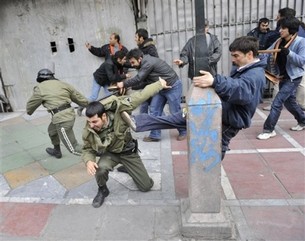Answering Andrew
The real problem here is that analysts such as Sullivan have consistently exaggerated the 'revolutionary' toll these protests have taken on the Iranian regime. I don't think Tehran engages in the kind of navel-gazing that has taken place in the West since June 12, so the regime is quite aware of its limitations and it options.

Regarding today's upheaval in Tehran, Andrew Sullivan asks:
How does the regime survive this massive demonstration of its fragility?
This is a repressive regime. It will survive the way it always has. It's important to note that this is in fact a reserved response by the regime in handling what is a very delicate internal crisis of legitimacy. But if it comes to it, like any cornered animal, they will revert to greater brutality and violent coercion.
How does the clergy react to these scenes of total mayhem?
If by clergy he means the reactionary principlist factions, well, they've never held much regard for public sentiment to begin with. They'll no doubt blame the United States, the British, Mossad or some nefarious internal element. Or, they will simply continue to downplay the protests.
How does Ahmadinejad blame all this on Obama, the Queen and the BBC?
I'm guessing with relative ease and impunity.
The real problem here is that analysts such as Sullivan have consistently exaggerated the 'revolutionary' toll these protests have taken on the Iranian regime. I don't think Tehran engages in the kind of navel-gazing that has taken place in the West since June 12, so the regime is quite aware of its limitations and its options. As I note above, for all of the promise and hope we've seen on (mostly) the streets of Tehran since the presidential election, the regime's response has in fact been somewhat reserved and cautious.
Andrew refers rather whimsically to today as Tehran's Tiananmen Square, however the often overlooked aftermath of Tiananmen was a severe government crackdown, one resulting in hundreds--if not thousands--of deaths. There were show trials and executions. The Communist leadership used the events as a purging mechanism, and many of the country's internal reformers were deported or fled the country.
For the sake of those Iranians protesting today, let's hope Sullivan is wrong.
UPDATE: Not quite what I said, but fair enough.
UPDATE II: Perhaps I should clarify matters in anticipation of the Dish readers who may not be familiar with my position. I absolutely believe the June 12 election was stolen, and I subscribe to the theory that the IRGC police state has slowly been consolidating power over the last decade or so. I think the Green Movement, while often exaggerated and misunderstood, is remarkable and worthy of praise.
That said, I do not think this is a revolution akin to 1979, and I question the very usage of that word. And if the protesters had been given their rather modest demands on June 13, this would still be an anti-American, anti-Israeli and pro-nuclear program regime. And even if the current regime eventually succumbs to this movement, the international community doesn't have the luxury of waiting and seeing if this revolution can occur before Iran has a nuclear weapon.
Or, in short, what Andrew Sullivan's reader said.
(AP Photo)





